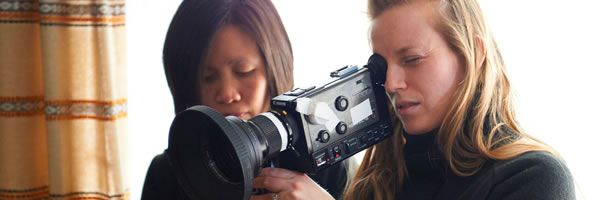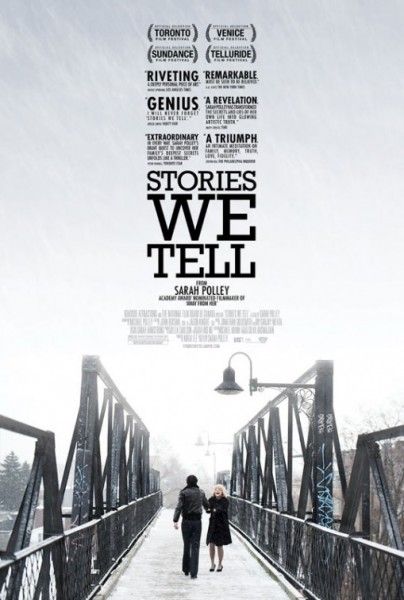From filmmaker/actress Sarah Polley, Stories We Tell investigates the search for truth, as told by a family of storytellers who paint a portrait of a complicated but deeply loving family. As each interview subject relates their version of the family mythology, they attempt to uncover the secrets of their mother, who departed too soon and with too many unanswered questions.
At the film’s press day, Sarah Polley talked about the value in getting this narrative out to audiences, what was most important for her to get right with this story, what the film did for her personally and how she felt when it was complete, whether everything in the film is factual, how she wanted to account for her own voice as the filmmaker, and the process of taking breaks in shooting to edit the material she already had. Check out what she had to say after the jump, and be aware that there are some spoilers.
When you set out to make this, what value did you see in getting this narrative out there?
SARAH POLLEY: I think, for me, the story itself wasn’t enough to want to make a film about it. You know that things that happens whenever anything even mildly coincidental happens in your life and people go, “That would make a great movie,” and you’re like, “No, it wouldn’t.” I remembered that when these events happened in my own life, they were really impactful for me and the people in my life, but as a story or a film, I felt like I had seen it, many times. I think what was exciting for me to explore and what I wanted to make the film about was the fact that we were all telling stories about it, and we were all writing about it or talking about it, and the story was changing, as it got told more and more. It was coming back to me, third and fourth hand, from friends of friends, as a totally different story, sometimes with inaccuracies, but sometimes just with totally different emphasis placed on various part of it, based on what resonated for people. So, what became fascinating to me was why we tell stories, why we want to create a narrative arc out of these messy events in our lives, and how that’s a basic human need.
What was most important for you to get right, when it came to this story?
POLLEY: I wanted to make sure that nobody who participated in the film would feel really misrepresented. Even though nobody has their entire version in the film and nobody else has a film that they would have made, I wanted to make sure that I wasn’t taking things too out of context in ways that were intentional. I think I most wanted to feel like everybody was heard, to a certain extent.
How has your biological father felt about this whole experience and the final cut of the film?
POLLEY: He’s been really supportive. It’s obviously not the film he would have made, and he’s pretty clear about that in the film. But, I think his point is valid when he says, “The part of this story that has to do with my relationship with your mother is really only mine to tell because she’s not alive to tell it, and we’re the only two people who were there for it.” In the film, he actually is pretty much the only person who tells that part of the story. And I think his arguments for that are quite eloquent, and helped me develop this whole other part of the film that’s really a critique of the film itself. So, I think he certainly has some reservations and some comments about the film, but he’s been very supportive and he came to the premiere. He ultimately gave us four days to be interviewed for a film that he didn’t agree with, so I think that’s a pretty generous act, in itself.
What did this film do for you, personally, and how did you feel once it was complete?
POLLEY: It was a really hard process to make it. I never felt completely at peace with the idea that I was making it, in the first place, and yet I felt compelled to keep going. It was an amazing collaboration, especially with my D.O.P., Iris Ng, and my editor, Mike Munn, and my producer, Anita Lee. I had amazing people in all departments, but it was a really incredible thing to collaborate so closely with people and to let people so far into the process of constructing and figuring out the film together. I think it was a very interesting experience to get feedback from other people and hear about what completely different films they were seeing. There’s a few reveals in the film, and people seemed to get those reveals at totally different points. So, it’s really interesting to see how subjective the watching of the film is, which is what I tried to make a film about, with how we perceive the same story and how it means something different to each person. It’s cool that the project of the film itself is continuing into rolling the film out for release. The richest part of the whole experience of making the film, to be honest, is to hear other people’s family stories. I find them fascinating, and I’m thrilled that people come out thinking about their own families, instead of mine. It’s been great that people have felt like they can talk about their own lives, instead of just mine.
Is everything in this film factual?
POLLEY: For me, a really important part of the process was to include multiple perspectives, and to not make it just one version or another. Whether everything in the film is fact, I don’t know. Nothing in the film is intentionally taken out of context, and I think that everybody that’s interviewed in the film is truthful about their memories of events. Whether their truthful memories of events are actually fact, I have no idea, and I don’t think anybody can know that about their own life. But, I think people were as truthful as they could be. They tried, at least, and so did I. What was interesting about the subject matter was the discrepancies in our versions of the same events, and how we grapple with that.
How did you want to account for your own voice in the film, as a filmmaker? Did you want to include your own opinions and theories, or did you want to be as impartial as possible?
POLLEY: I saw my role in the film as the investigator who’s with the audience, discovering this and trying to capture it and construct it out of everybody else’s versions. There isn’t a voice of God voice-over that talks about my feelings and impressions, mostly because it felt like while maybe other people would find it interesting, it was besides the point of what I was trying to achieve. So, my role in the film is really to construct the film and put together the story. I didn’t want to leave that out because, since it’s about storytelling, it would feel false to leave out the very subjective process of putting together this film.
How did it help you to shoot for a bit, and then edit for awhile, and then shoot for a bit again?
POLLEY: It was hugely helpful. I think there’s so much more space for rigorous thought, and to really make intelligent decisions based on what is happening, as opposed to what you decided was going to happen. I would love it, if there were the budget to work like that on a fictional film, as well – to be able to shoot, and then go away and think about it, and then come back at it. It’s definitely the way I would make a documentary, in the future. Especially when you’re dealing with real people’s lives, I think it’s really important to have that space and time to really think about what you’re doing, before you go back to it. It also allowed my editor, Mike Munn, who I think was a co-writer and co-director of this film, to have that input and be involved in the process, which was hugely important to the sensibility of the film.
At what point did you realize that there was something worthwhile about this film and that people should see it?
POLLEY: I definitely never had that moment, and I still haven’t. I still have enormous ambiguity about it being out in the world. It’s a very, very strange process. I think that what was hardest about making the film was that it felt a bit like I was grappling in the dark. I didn’t feel like I had a model for what I was trying to do, but that’s also the thing that kept me going. I felt like I might never have the experience again, of making something that I’m really trying to figure out how to do without something to look to. It’s not like I wasn’t inspired by other films. There are lots of films that really inspired me, and I don’t think I invited anything here. But, I did feel like it was more original than what I had done before, and that kept me going, even though I felt the risks of exposing myself and exposing my family were terrifying to me. The fact that they were all so supportive helped me keep going, as well.
Stories We Tell opens in theaters in New York on May 10th and in Los Angeles on May 17th.


